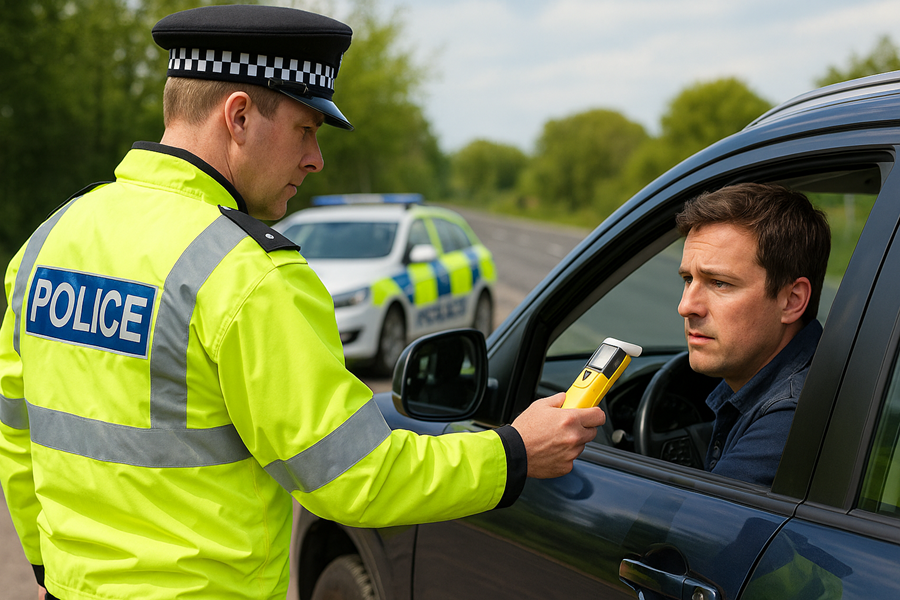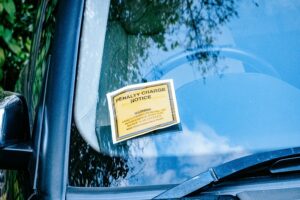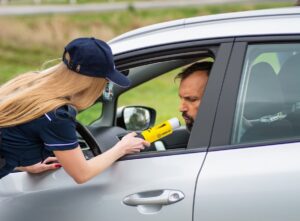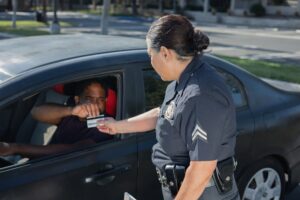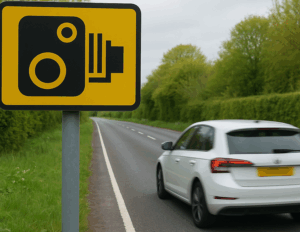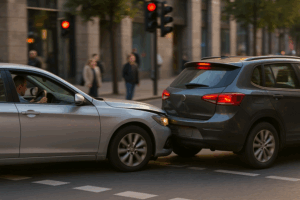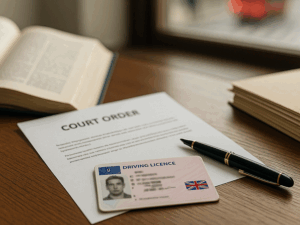Failing to provide a specimen: sentencing guidelines in the UK

During a roadside check in the UK, the police may ask you to take a breathalyser test. However, complying with the test can have serious consequences if you exceed the legal alcohol limit. In these complex situations, consulting a solicitor specialising in Driving and motoring offence cases is essential to protect your rights and understand your legal options.
KEY TAKEAWAY: Should you take the breathalyser test despite the risks?
In the following sections, we will examine your legal rights, the severe penalties you may face and potential defence strategies for dealing with such charges.
Your rights during a roadside check
In the United Kingdom, your legal obligations during a roadside check are governed by the Road Traffic Act 1988. This statutory framework precisely defines when and how police can lawfully request you to provide specimens to determine your blood alcohol concentration.
When can police legally require a test?
Police may lawfully request specimen testing in several specific circumstances:
- Suspicion of drink driving: Observable indicators including erratic driving behaviour, alcohol odour, or dangerous manoeuvres.
- Road traffic accidents: Any collision involving personal injury or property damage.
- Moving traffic violations: Speeding, dangerous driving, or other road traffic offences.
- Routine stops: At designated checkpoints or during lawful traffic stops.
What types of specimens can be requested?
Police may request different specimen types epending on circumstances and available facilities:
- Breath specimens: The most common roadside test using calibrated breathalyser equipment. If you fail to provide breath test, this constitutes a serious criminal offence carrying mandatory penalties.
- Urine specimens: Utilised when breath testing proves impractical or to detect specific controlled substances. Refusal to provide urine constitutes fail to provide a urine/blood sample under current legislation.
- Blood specimens: Required when precise measurements are necessary or when drivers cannot provide breath specimens. Refusing blood sampling also constitutes fail to provide urine/blood sample with identical penalties.
Are you legally obliged to provide a specimen?
Under UK law, drivers are under absolute legal obligation to comply with police specimen requests during roadside checks, except in extremely limited circumstances involving genuine medical conditions or physical incapacity. These narrow exceptions apply only where specimen provision would be genuinely dangerous or physically impossible.
Recognised medical exceptions:
- Severe respiratory conditions: Documented severe asthma where breathalyser use poses genuine medical risk. Contemporary medical certification detailing the specific condition and contraindications is mandatory.
- Chronic pulmonary disorders: Conditions including chronic obstructive pulmonary disease, emphysema, or severe bronchitis making breath testing impossible or medically dangerous. Recent specialist medical reports must substantiate claims.
- Systemic medical conditions: Diabetes, blood clotting disorders, or other conditions making blood or urine sampling medically contraindicated. Comprehensive medical documentation must conclusively establish the impossibility of safe specimen provision.
Can you get away with failing to provide a specimen?
In exceptional circumstances, yes, but successful defences are extraordinarily rare and require compelling evidence. Courts treat specimen refusal as presumptively criminal, placing substantial evidential burdens on defendants.
Extremely Limited Successful Defence Scenarios:
- Compelling medical evidence: Documented inability to provide specimens due to serious, professionally verified health conditions with clear contraindications to testing.
- Fundamental police procedural failures: Rare instances where officers breach mandatory procedures:
– Inadequate statutory warnings: Police must clearly explain that refusal constitutes a serious criminal offence. Failure to provide proper warnings may invalidate proceedings
– Equipment failures: Demonstrably faulty, uncalibrated, or malfunctioning breathalyser or sampling equipment can undermine prosecution cases.
– Procedural breaches: Absence of required witnesses, inadequate opportunity to comply, or other significant procedural violations.
Penalties under failing to provide a specimen sentencing guidelines
Refusing breathalyser test or other specimens triggers severe criminal penalties. The failing to provide a specimen sentencing guidelines establish comprehensive punishment frameworks that courts must follow.
Mandatory criminal penalties:
- Driving disqualification: Minimum 12-month prohibition, potentially extending to several years for repeat offenders or aggravating circumstances.
- Substantial financial penalties: Fines reaching £5,000, calculated according to offender means and offence severity using statutory guidelines.
- Custodial sentences: Prison terms up to 6 months for serious cases, particularly involving repeat offending or dangerous driving circumstances.
Aggravating Factors increasing sentences:
- Previous convictions for refusing breathalyser test or drink/drug driving offences.
- Accident involvement or dangerous driving linked to specimen refusal.
- Professional driving responsibilities or commercial vehicle operation.
- High-risk circumstances or public endangerment.
Potential mitigating circumstances:
- Genuine, professionally documented medical conditions preventing specimen provision.
- Exceptional personal circumstances explaining refusal behaviour.
- Early guilty pleas demonstrating genuine remorse.
- Clean previous driving records with isolated offending.
Consequences of complying but exceeding legal limits
UK drink driving limits are strictly enforced: 35 micrograms per 100ml breath, 80 milligrams per 100ml blood, or 107 milligrams per 100ml urine. Exceeding these thresholds triggers automatic criminal proceedings, often with more severe consequences than simple specimen refusal.
Penalties correlating with alcohol levels:
- Extended driving prohibitions: Significantly elevated readings result in disqualification periods substantially exceeding standard 12-month minimums.
- Enhanced financial penalties: Fines increase proportionally with alcohol levels and may reach maximum statutory limits.
- Custodial sentences: High readings, particularly combined with dangerous driving or accident involvement, frequently result in immediate imprisonment.
- Aggravated circumstances: Repeat offending, accident causation, or reckless driving behaviour substantially increase penalty severity.
Do I need a solicitor for refusing breath test?
Given the complexity of failing to provide a specimen sentencing guidelines and potential defence strategies, specialist legal representation is essential. Experienced solicitors specialising in driving and motoring offence cases provide:
Pre-trial legal services:
- Comprehensive evidence analysis identifying potential procedural failures or weaknesses.
- Medical evidence gathering supporting reasonable excuse defences.
- Prosecution negotiation seeking charge reductions or alternative disposals.
- Strategic advice on optimal defence approaches and likely outcomes.
Court representation:
- Expert advocacy when pleading not guilty to failing to provide a specimen.
- Professional cross-examination of prosecution witnesses and technical evidence.
- Mitigation presentations minimising sentences where convictions are inevitable.
- Complex legal argument on procedural, evidential, and technical issues.
Post-conviction support:
- Appeals against conviction or sentence where appropriate grounds exist.
- Licence restoration applications and hardship arguments.
- Insurance and employment consequence mitigation.
FAQs
Can I continue to drive while awaiting trial?
Yes, unless police have imposed immediate licence suspension or court has ordered interim disqualification.
How long do driving convictions remain on my record?
Drink driving convictions remain on DVLA records for 11 years and may appear on enhanced criminal record checks indefinitely.
Will conviction affect my employment prospects?
Yes, particularly for roles involving driving, working with vulnerable groups, or positions requiring enhanced security clearance.
Can insurance companies cancel my policy?
Absolutely. Conviction typically results in policy cancellation or premium increases of 200-500% upon renewal.
Refusing breathalyser test constitutes serious criminal conduct carrying severe, life-changing consequences. Understanding the failing to provide a specimen sentencing guidelines and your legal obligations is crucial for all UK drivers.
Drive responsibly!
Understand your legal obligations, and seek consult Qredible’s network of criminal law solicitors if facing any motoring charges.
KEY TAKEAWAYS:
- Understanding your legal obligations provides the best protection against inadvertent criminal conduct.
- Only genuine, professionally documented contraindications justify specimen refusal.
- Complex legal and technical issues require specialist driving and motoring offence
- Failure to provide a specimen charges often carry more severe consequences than cooperation.
- Immediate specialist legal consultation maximises defence prospects and mitigation opportunities.
Articles Sources
- legislation.gov.uk - https://www.legislation.gov.uk/ukpga/1988/52/section/7
- sentencingcouncil.org.uk - https://www.sentencingcouncil.org.uk/offences/magistrates-court/item/fail-to-provide-specimen-for-analysis-driveattempt-to-drive-revised-2017/
- gov.uk - https://www.gov.uk/stopped-by-police-while-driving-your-rights
- cps.gov.uk - https://www.cps.gov.uk/legal-guidance/road-traffic-drink-and-drug-driving
Do you need a solicitor?
Find a solicitor on Qredible in just a few easy steps


